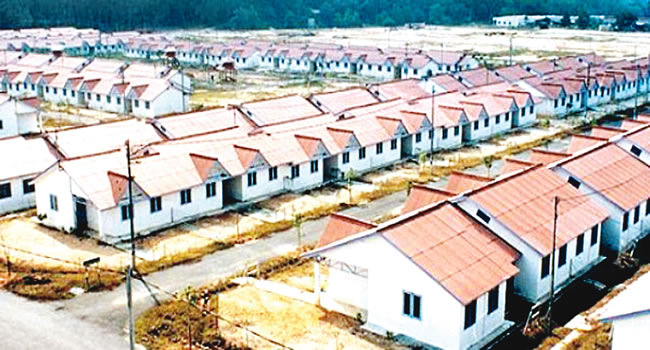[ad_1]
Experts, while decrying the unsatisfactory performance of the nation’s housing corporations in recent times, give some useful suggestions on how to turn around the fortunes of these agencies to deliver on their mandate. DAYO AYEYEMI reports
Housing corporations are statutorily created as government agencies to execute public housing programme and undertake the development of housing estates within the overall framework of the national housing policy.
This role they have been performing creditably over the years until a downward trend set in in the midst of over 17 million housing deficit in the country.
Despite the need to produce 700,000 dwelling units annually for next 20 years to bridge the nation’s accommodation gap, the total number of housing units built (public and private sectors) last year was less than 100,000 units, raising the poser about the role of housing corporations.
Speaking with the major stakeholders, reasons not limited to lack of political will, inadequate budgetary’s provision, harsh economy, lack of innovation, absence of long-term fund, lack of commitment by successive governments and usurpation of responsibilities of housing corporations by the ministries, among others were identified as major factors responsible for the housing agencies’ underperformance.
The stakeholders also suggested ways to turn around the fortunes of these corporations for optimal performance in the provisions of social and rental housing for teeming population of low-income Nigerians.
Experts’ views
Speaking with the Nigerian Tribune, Managing Director, Sola Enitan & Co, Otunba Sola Enitan, took time to correct the impression that the state housing corporations are dead, saying they are not. Rather, he said they have been starved of funds.
According to him, government policies made it extremely difficult for the housing agencies to source funds for housing developments through the commercial banks.
“Construction loans and securitised mortgages are the lifeblood of good housing system. If the governments can change their paradigm on the housing and see it as infrastructure necessary for fulfilment of the welfare of people as enshrined in the constitution, our lot will definitely be better,” he said.
To revamp these agencies, Enitan wants the government to set up the “State Housing Trust Fund (SHTF) and put a Affordable and Social Housing Law which will provide for the Housing Trust Fund Management Board and also engender a social housing system with institutional and financial frameworks that will achieve the intendment.”
He pointed out that the challenges of the housing corporations were largely inadequate finance, lack of access to good quality lands, and government’s lack of political will to see to the alleviation of the sufferings of the masses.
According to Enitan, the best approach was for the housing agency to create a financial framework that funds its construction activities within the state.
Executive secretary, Association of Housing Corporations of Nigeria, Mr Toye Eniola, pointed out that government’s support is important to the survival of any housing agency.
This support, he pointed out, has to start with a deliberate policy to embark on social mass housing through the budget provision.
Secondly, he said the support could also come through the government by assisting the housing corporations to secure long-term facilities, while the former stand in as the guarantor for such housing loans.
He listed lack of commitment by successive governments because of the long-term nature of housing projects; absence of support by the state government and usurpation of traditional responsibilities of housing corporations by ministries or sometimes creating parallel organisations through joint venture without support to existing agencies as major challenges in the industry.
To keep the state housing agencies afloat, the executive secretary of AHCN, wants the respective state governments to deliberately support them in order to embark on provision and management of mass rental housing as well as provision of social housing.
This he said should come with government’s guarantee to source long-term funding at a single-digit rate.
“Government should come up with deliberate policy to embark on mass housing through the Federal Housing Authority (FHA) and state housing corporations thereby using such project as avenue to revamp the economy,” he said.
US-based affordable housing finance advocate, Mr Kunle Faleti, cited developed economies’ example
According to him, in developed economies, state housing corporation “means a corporation established by a state for the limited purpose of providing housing and incidental services, particularly for families of low or moderate income.”
He defined housing corporation as an organisation that focuses on building, managing and renting good quality housing with an affordable rent for people with a limited income (social housing).
“Housing corporations often manage large parts of a city through their development and maintenance of large quantities of houses,” he said.
Need for strategic alliances
For survival, Faleti urged CEOs of the housing corporations not to rely solely on government’s funding.
According to him, there must be strategic alliances, collaborations, joint ventures with the private sector, foreign investors, nonprofitorganisations to be able to deliver on the goals of social housing.
Presently, he noted that most housing corporations in Nigeria are limited by their legally defined tasks and responsibilities.
“The challenge is simple – these MDA’s as the case may be are run as ministries.
“Pay is low, morale is low, measurable goals are not set, there is a dearth of skills set.
“You cannot run a housing corporation as a ministry and expect great results,” the expert said.
To come out of the woods, Faleti said that these corporations must, first, hold a societal responsible to provide good quality housing to those who cannot afford much.
He said “A housing corporation is not a housing finance agency. In most states, they are set up playing dual role, which is roadmap to failure.
“Take Lagos for example, it has ministry of housing, Lagos State Development and Property Company (LSDPC), Lagos Home Ownership Mortgage Scheme (LAG- HOMS), Lagos State Real Estate Regulation Agency (LASRERA), IBILE Properties and Bureau of Lands – this is a reason why it is successful in delivering social housing albeit some may disagree due to the cost of these houses.”
According to him, a state must have a governor that knows, appreciates and understands the importance of housing to economic development in order to have a vibrant housing corporation.
“If there is no passion and vision at the top, any policy relating to housing is as good as dead,” he said.
Speaking during the sixth International Conference of the Association of Housing Corporations of Nigeria (AHCN) held in Lagos last year, founder/president, First World Communities Ltd, Brig. Gen. P.M.O. Reis (rtd), urged the housing corporations to embark on strategic initiatives to become key players in affordable housing delivery on an unprecedented and sustainable large-scale in Nigeria.
According to Reis, such strategic initiatives must centre on the creation of an enabling environment, promotion of research and advocacy and development of business support.
He also emphasized that they would need to modernise for effectiveness.
In his paper ‘Re-defining Housing Corporations For Solving The Housing Deficit in Nigeria’, he urged the agencies across Nigeria to develop and promote new models for delivering affordable world-class homes while improving the existing homes
According to him, they must map out their potential, influence land release and planning policy, and develop an effective and sustainable rent policy.
“Improve political interest and support for housing to ensure that it features prominently in election manifestos,” he said.
Reis also urged them to promote through research, education, forum, and other appropriate means the development of housing units.
He called for the establishment of standards for operation of housing corporations that will assure maximum long-term benefits to customers and sustain corporations.
AHCN’s mandate
AHCN is the umbrella body of all housing corporations in Nigeria.
It has a mandate to increase availability of residential estates in Nigeria.
AHCN’s vission is to ensure the increase and availability of dwelling houses across the country.
In a recent communique signed by both the president and general secretary of AHCN, Dr. Victor Onukwugha and Mr. Olusesan Obe respectively after a workshop on how to facilitate affordable housing for low and medium income earners, stakeholders at the forum bemoaned the increasing housing shortage and acute problem of housing availability, accessibility and affordability for low- income earners without corresponding actions to match the demand.
They also identified mass rental housing as untapped viable option of sustaining housing corporations to reduce impact of housing shortage especially on low and medium income group.
To address these, the participants called for an urgent collaboration among stakeholders with pragmatic and realistic strategies that will directly address the housing needs of the people and, at the same time, create and empower the people to reduce unemployment in Nigeria.
They also called on the state governments to support their housing agencies in driving rental housing across Nigeria to take care of the segment that could not afford outright purchase of homes through Family Homes Funds window.
They want all the state governments to create conducive environment to make affordable housing available to low and medium income earner.
Unremitted contributions by banks, insurance companies
The workshop condemned in strong term non-compliance of commercial and merchant banks, insurance companies and federal government to the statutory regulation that mandate them to contribute certain percentage of their incomes to the National Housing Fund, (NHF)
Stakeholders at the forum called for immediate implementation of this statutory contribution to create strong financial base for the NHF to meet and adequately cater for the loans request of the low and medium income group.
They also identified defective strategies as well as non-execution of public housing programmes based on the overall framework of the national housing policy as responsible for widening housing deficit especially among low and medium income group. As a result, they called on the federal and state governments to declare state of emergency on housing deficit by embarking on social housing with workable implementation and practical solutions that suit our social system to halt rising housing deficit in the country.
On the increasing rural-urban migration culminating in continued food insecurity and pressure on unemployment and infrastructures in urban centres, the stakeholders called for the establishment of the Agric-villages and farm settlements in all the local governments across the country as panacea for addressing and resolving food production shortages and housing deficit, thereby creating job opportunities for millions of jobless youths across the federation.
They recognised the inherent opportunities in business partnerships in developing business synergies and strategic alliances to reduce cost and expand into new markets in housing provision. They, therefore, called for effective partnership models and synergies between Family Homes Funds and the Federal Mortgage Bank of Nigeria, FMBN to enhance development funding and wholesale mortgage lending and origination to reduce housing shortfall in Nigeria.







